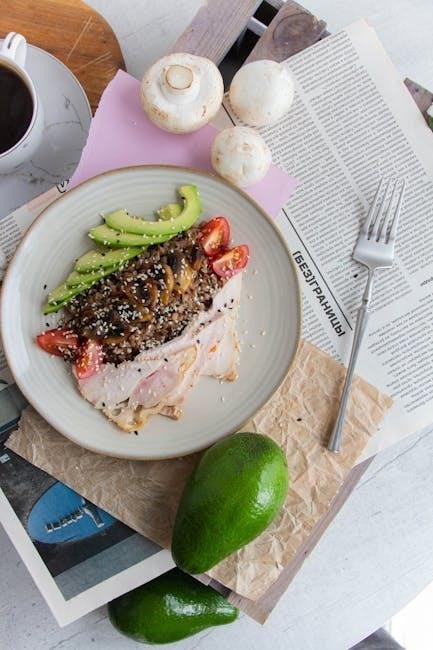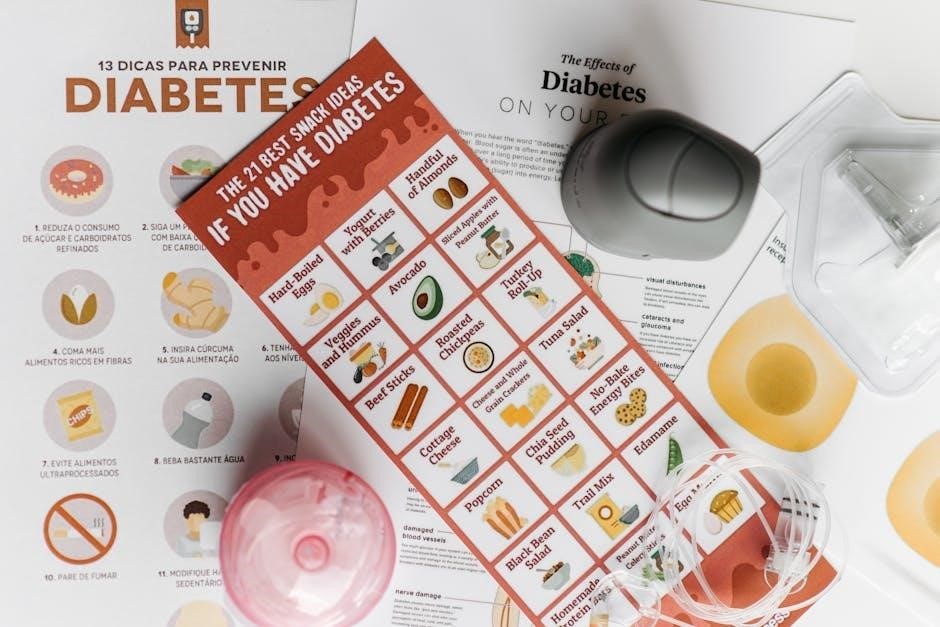
Psoriasis is a chronic inflammatory skin condition influenced by genetics, immunity, and environmental factors, including diet. A strategic dietary approach can help alleviate symptoms and improve overall health.
While there’s no cure, dietary adjustments can reduce inflammation and flare-ups. A well-structured psoriasis diet plan focuses on anti-inflammatory foods, balanced nutrition, and avoiding triggers like processed foods and alcohol.
Adopting a diet rich in fruits, vegetables, and whole grains can boost the immune system and reduce inflammation, making it easier to manage psoriasis effectively.
1.1 Understanding Psoriasis
Psoriasis is a chronic inflammatory skin condition characterized by accelerated skin cell growth, leading to thick, scaly patches. It involves an overactive immune system, genetic predisposition, and environmental triggers. While the exact cause remains unclear, factors like diet, stress, and infections can exacerbate symptoms. Psoriasis is not merely a skin disease but is linked to systemic inflammation, often associated with conditions like arthritis or metabolic syndrome. Understanding its multifaceted nature is crucial for developing effective management strategies, including dietary adjustments.
1.2 The Role of Diet in Managing Psoriasis
Diet plays a crucial role in managing psoriasis by reducing inflammation and preventing flare-ups. Certain foods can trigger inflammation, while others may help alleviate symptoms. Eating anti-inflammatory foods, avoiding triggers like processed foods and alcohol, and maintaining a balanced diet can significantly impact psoriasis management. A well-planned diet is part of a holistic approach to managing the condition, alongside other lifestyle changes. Understanding how specific foods affect your symptoms is key to creating a personalized nutrition plan tailored to your needs.
1.3 Importance of a Psoriasis Diet Plan
A psoriasis diet plan is essential for managing symptoms and improving quality of life. By focusing on anti-inflammatory foods and avoiding triggers, individuals can reduce inflammation and prevent flare-ups. A structured plan helps maintain consistency, ensuring nutrient-rich meals that support skin health and overall well-being. Tailored diet plans also address individual needs, promoting long-term symptom control and reducing the risk of comorbidities. Thus, adopting a thoughtfully designed diet is a proactive step toward managing psoriasis effectively and enhancing one’s health.

Foods to Include in a Psoriasis Diet
Incorporating anti-inflammatory foods like fresh fruits, vegetables, whole grains, lean proteins, and healthy fats can help reduce inflammation and promote healing in psoriasis management.
2.1 Fresh Fruits
Fresh fruits are rich in antioxidants, vitamins, and minerals, making them a cornerstone of a psoriasis-friendly diet. Berries, citrus fruits, and apples are particularly beneficial due to their anti-inflammatory properties, which help reduce inflammation and promote skin health. Incorporating a variety of colorful fruits into meals and snacks can boost the immune system and support overall well-being, aiding in the management of psoriasis symptoms effectively.
2.2 Vegetables
Vegetables are packed with antioxidants and anti-inflammatory compounds, making them essential for managing psoriasis. Leafy greens like spinach and kale, as well as cruciferous vegetables such as broccoli and Brussels sprouts, are particularly beneficial. These foods help reduce inflammation and promote skin health. A colorful variety of vegetables should be included in daily meals to provide essential vitamins and minerals that support immune function and overall well-being, aiding in the alleviation of psoriasis symptoms.
2.3 Whole Grains
Whole grains are rich in fiber, vitamins, and minerals, making them a great addition to a psoriasis diet. They help reduce inflammation and provide sustained energy. Opt for brown rice, quinoa, oats, and barley, as these are excellent sources of nutrients. Whole grains also support digestive health, which is crucial for managing psoriasis. Incorporate them into meals to help regulate inflammation and promote overall well-being. Avoid refined grains, as they can trigger inflammation and worsen symptoms. Choosing unprocessed whole grains ensures maximum nutritional benefits for skin health.
2.4 Lean Proteins
Lean proteins are essential for tissue repair and immune function, which are crucial for managing psoriasis. Include sources like chicken, turkey, fish, tofu, and legumes in your diet. These proteins are low in saturated fats and can help reduce inflammation. Fatty fish, such as salmon, are particularly beneficial due to their high omega-3 fatty acid content, which fights inflammation. Avoid processed meats and opt for organic, grass-fed options when possible to maximize health benefits and minimize flare-ups. Incorporating lean proteins helps maintain healthy skin and overall well-being. Be mindful of portion sizes to avoid overconsumption of protein.
2.5 Healthy Fats
Healthy fats are crucial for reducing inflammation and promoting skin health in psoriasis. Include sources like avocados, nuts, seeds, and olive oil, which are rich in anti-inflammatory properties. Omega-3 fatty acids from fatty fish, such as salmon and mackerel, are particularly beneficial for reducing inflammation. Avoid unhealthy fats like trans fats and excessive saturated fats, as they can worsen inflammation. Incorporating healthy fats into meals helps balance nutrition and supports overall well-being, making them a key component of a psoriasis-friendly diet. They also aid in the absorption of essential vitamins and minerals.
2.6 Organic and Non-GMO Foods
Organic and non-GMO foods are recommended for managing psoriasis as they reduce exposure to harmful pesticides, artificial additives, and genetically modified organisms. These foods promote a cleaner diet, minimizing toxins that can trigger inflammation. Organic options like fruits, vegetables, and whole grains are rich in antioxidants and essential nutrients, supporting skin health and immune function. Choosing non-GMO ensures avoidance of potential allergens and irritants, helping to maintain a balanced and psoriasis-friendly diet. Prioritizing organic can enhance overall well-being and skin clarity.

Foods to Avoid
Certain foods can trigger psoriasis flare-ups, including processed foods, red meat, dairy, alcohol, refined sugars, and artificial sweeteners. These can increase inflammation and worsen symptoms.
3.1 Processed Foods
Processed foods are high in preservatives, artificial additives, and unhealthy fats, which can trigger inflammation and worsen psoriasis symptoms. These foods often contain refined sugars, sodium, and harmful chemicals that disrupt the body’s natural balance. Examples include packaged snacks, frozen meals, and sugary drinks. Consuming such foods regularly can lead to chronic inflammation, exacerbating skin flare-ups. It’s crucial to limit or avoid these items and opt for whole, nutrient-rich foods instead. A diet focused on fresh ingredients can help reduce inflammation and support overall skin health.
3.2 Red Meat
Red meat, particularly when consumed in excess, can trigger inflammation and worsen psoriasis symptoms. Processed red meats like sausages and bacon contain advanced glycation end (AGE) products, which promote oxidative stress and inflammation. High iron and saturated fat content in red meat can also contribute to flare-ups. Moderation is key, but opting for leaner protein sources like poultry or fish is generally recommended to support skin health and reduce inflammatory responses associated with psoriasis.
3.3 Dairy Products
Dairy products, especially those high in saturated fats and lactose, can exacerbate psoriasis symptoms in some individuals. Milk and cheese contain arachidonic acid, which may promote inflammation. Additionally, lactose intolerance or sensitivity can trigger immune responses, worsening skin conditions. While not everyone with psoriasis reacts negatively to dairy, it’s often recommended to limit or avoid high-fat dairy products and opt for low-fat or non-dairy alternatives to reduce potential inflammation and improve skin health.
3.4 Alcohol
Alcohol consumption can worsen psoriasis symptoms by increasing inflammation and weakening the immune system. It also impairs liver function, which plays a key role in detoxification. Excessive alcohol intake can trigger flare-ups and reduce the effectiveness of psoriasis treatments. Limiting or avoiding alcohol is often recommended to manage the condition better and support overall health.
3.5 Refined Sugars
Refined sugars can cause inflammation, which may exacerbate psoriasis symptoms. They promote the release of inflammatory markers and contribute to metabolic issues. Foods like candy, sodas, and baked goods often contain high amounts of refined sugars. Reducing sugar intake helps minimize flare-ups and supports overall skin health. Opting for natural sweeteners like fruits or honey in moderation is a healthier alternative for managing psoriasis effectively and maintaining a balanced diet.
3.6 Artificial Sweeteners
Artificial sweeteners like aspartame and saccharin can trigger inflammation and worsen psoriasis symptoms. They may cause allergic reactions or alter gut bacteria, exacerbating skin issues. Studies suggest these additives can affect immune responses, potentially leading to flare-ups. Avoiding products containing artificial sweeteners is advisable. Instead, consider natural alternatives such as stevia or monk fruit to manage sweetness cravings without compromising psoriasis management. This adjustment supports overall health and reduces inflammation, aiding in better skin care.

Specific Diets for Psoriasis
Various diets like alkaline, Mediterranean, gluten-free, and vegetarian plans are recommended for managing psoriasis. These diets focus on reducing inflammation, promoting healing, and improving overall skin health.
4.1 Alkaline Diet
The alkaline diet focuses on balancing acid and alkaline foods, recommending an 80-20 ratio. It emphasizes fresh fruits, vegetables, whole grains, and healthy fats while minimizing processed foods, red meat, dairy, and alcohol. This diet aims to reduce inflammation and promote healing by maintaining the body’s natural pH balance, which can help alleviate psoriasis symptoms and improve overall health. By incorporating alkaline-rich foods, individuals can support their skin health and potentially reduce flare-ups associated with psoriasis.
4.2 Mediterranean Diet
The Mediterranean diet emphasizes fresh fruits, vegetables, whole grains, and healthy fats, such as olive oil, while minimizing processed foods and alcohol. It is rich in antioxidants and omega-3 fatty acids from fatty fish, which reduce inflammation. This dietary approach promotes better skin health and reduces psoriasis flare-ups. By focusing on nutrient-dense foods, the Mediterranean diet supports overall well-being and can be tailored to meet individual needs for managing psoriasis effectively.
4.3 Gluten-Free Diet
A gluten-free diet is often recommended for individuals with psoriasis, particularly those with celiac disease or gluten sensitivity. Gluten can trigger inflammation and worsen symptoms. Removing gluten from the diet may reduce skin flare-ups and improve overall health. Focus on gluten-free whole grains, fruits, vegetables, and lean proteins. This dietary adjustment can help manage psoriasis symptoms effectively by minimizing inflammatory responses and promoting healing.
4.4 Vegetarian Diet
A vegetarian diet is highly beneficial for managing psoriasis due to its focus on anti-inflammatory and nutrient-rich foods. Plant-based meals, including fruits, vegetables, whole grains, and legumes, provide essential vitamins and minerals. A vegetarian diet reduces inflammation and eliminates pro-inflammatory animal products that may trigger psoriasis flare-ups. It also supports overall immune health and skin well-being, making it an excellent choice for those seeking natural ways to manage their condition effectively.

Meal Plan for Psoriasis Management
A structured 7-day meal plan helps manage psoriasis symptoms by incorporating anti-inflammatory foods like vegetables, whole grains, and natural juices, promoting balanced nutrition and reduced inflammation.
5.1 7-Day Meal Plan
A 7-day meal plan for psoriasis management includes breakfast, midmorning snacks, lunch, afternoon snacks, and dinner, focusing on organic, non-GMO foods. Each day starts with a morning drink like green tea or lemon water to boost metabolism. Breakfast options include oatmeal with berries or avocado toast. Lunches feature whole grains like quinoa or brown rice, paired with vegetables and lean proteins. Snacks consist of fresh fruits or nuts, while dinners emphasize fish or plant-based proteins with steamed vegetables. The plan avoids processed foods, alcohol, and artificial sweeteners, promoting a balanced and anti-inflammatory diet to reduce flare-ups and improve skin health. Staying hydrated with herbal teas and natural juices is also recommended throughout the day.
5.2 Sample Breakfast Recipes
Start your day with nutrient-rich breakfast recipes designed to reduce inflammation and support skin health. Try oatmeal with fresh berries and a drizzle of honey, or avocado toast on whole-grain bread with a sprinkle of turmeric. Smoothies made with spinach, banana, and almond milk are also ideal. For a protein-packed option, consider chia pudding with coconut milk and chia seeds. These recipes are anti-inflammatory, easy to prepare, and help avoid common psoriasis triggers, promoting a balanced and healing start to your day.
5.3 Sample Lunch Recipes
Enjoy nourishing and flavorful lunches tailored for psoriasis management. Try a quinoa salad with roasted vegetables like zucchini, bell peppers, and cherry tomatoes, dressed with olive oil and lemon juice. Grilled chicken or fish paired with steamed broccoli and brown rice is another excellent option. For a light meal, consider a lentil soup with garlic and turmeric, served with a side of mixed greens. These recipes focus on anti-inflammatory ingredients, avoiding triggers and promoting healing, while keeping your meals delicious and satisfying.
5.4 Sample Dinner Recipes
For a satisfying and healing dinner, try baked salmon with a medley of steamed vegetables like asparagus and Brussels sprouts, seasoned with turmeric and olive oil. Another option is a vegetable stir-fry with bell peppers, zucchini, and spinach, cooked in coconut oil and served over quinoa or brown rice. A hearty lentil and vegetable stew with garlic, carrots, and sweet potatoes is also an excellent choice, spiced with anti-inflammatory herbs like cumin and paprika. These recipes emphasize fresh, organic ingredients and avoid trigger foods, promoting healing and reducing inflammation.
5.5 Snack Ideas
Healthy snacks for psoriasis management include fresh fruit like apples or berries, which are rich in antioxidants. A handful of raw nuts or seeds, such as almonds or flaxseeds, provides essential omega-3 fatty acids. Veggie sticks with hummus, like carrots or cucumbers, offer anti-inflammatory benefits. Smoothies made with spinach, berries, and almond milk are nutritious and filling. Air-popped popcorn without added salt or butter is a light, satisfying option. These snacks support skin health and reduce inflammation, fitting seamlessly into a psoriasis-friendly diet plan.

Supplements and Psoriasis
Supplements like vitamin D, omega-3 fatty acids, selenium, and zinc can support skin health and reduce inflammation, aiding in psoriasis management when combined with a balanced diet.
6.1 Vitamin D
Vitamin D is a key supplement for psoriasis management, as it supports skin health and immune function. Research suggests it may reduce inflammation and slow skin cell growth.
Many psoriasis patients have low vitamin D levels, making supplementation beneficial. However, it’s important to consult a healthcare provider to determine the right dosage and avoid over-supplementation.
6.2 Omega-3 Fatty Acids
Omega-3 fatty acids, found in fish oil, flaxseeds, and walnuts, are potent anti-inflammatory agents that can help reduce psoriasis symptoms. Studies indicate they may inhibit inflammatory pathways linked to psoriasis development.
Regular consumption of omega-3s can improve skin health and reduce flare-ups. Including these fats in your diet or supplementing under medical guidance can be beneficial for managing psoriasis effectively.
6.3 Selenium
Selenium is a powerful antioxidant that supports immune function and reduces oxidative stress, which can contribute to psoriasis flare-ups. Found naturally in Brazil nuts, fish, and turkey, selenium helps protect the skin from damage and inflammation. While selenium supplements may offer benefits, excessive intake can be harmful. Always consult a healthcare professional before adding selenium supplements to your psoriasis management plan to ensure safe and effective use.
6.4 Zinc
Zinc is an essential mineral with anti-inflammatory and immune-boosting properties, beneficial for managing psoriasis. It helps regulate skin cell growth and repair, reducing inflammation and plaque formation. Foods like oysters, red meat, and fortified cereals are rich in zinc. Supplements are available, but excessive intake can cause side effects. Consulting a healthcare provider is recommended to determine the appropriate dosage for your condition and avoid potential interactions with other treatments.

Hydration and Psoriasis
Staying hydrated is crucial for skin health and detoxification. Drinking plenty of water helps flush toxins, while natural juices provide essential nutrients to support healing and reduce inflammation.
7.1 Importance of Water
Water is essential for maintaining healthy skin and overall bodily functions. It aids in digestion, nutrient absorption, and flushing out toxins that can worsen psoriasis. Proper hydration helps regulate inflammation and supports skin cell renewal. Drinking at least 6-8 glasses of water daily is recommended to keep skin hydrated and promote healing. Additionally, incorporating herbal teas or natural juices can complement water intake and provide extra nutrients beneficial for skin health and psoriasis management.
7.2 Natural Juices
Natural juices, made from fresh, organic ingredients, can provide essential vitamins and antioxidants beneficial for skin health. Juices rich in carrots, beets, and leafy greens support detoxification and reduce inflammation. Citrus-based juices, like orange or grapefruit, offer vitamin C, which boosts the immune system. However, avoid sugary or processed juices, as they can trigger inflammation. Always opt for fresh, homemade juices without added sugars to maximize their therapeutic benefits and support psoriasis management effectively.
7.3 Herbal Teas
Herbal teas are a healthy, soothing option that can aid in managing psoriasis. They offer anti-inflammatory and antioxidant properties, which help reduce inflammation and promote healing. Chamomile tea is particularly beneficial for calming the skin, while green tea contains polyphenols that combat oxidative stress. Turmeric tea, with its curcumin content, is also highly anti-inflammatory. Herbal teas can support detoxification and stress reduction, both of which are crucial for psoriasis management. Opt for caffeine-free options and avoid adding sugars or artificial sweeteners to maximize their benefits and support skin health naturally.

Lifestyle Factors to Consider

Managing stress, exercising regularly, and ensuring adequate sleep are crucial for overall well-being and skin health, particularly for those managing psoriasis.
8.1 Stress Management
Stress is a known trigger for psoriasis flare-ups, as it can increase inflammation and worsen symptoms. Practicing stress-reducing activities like meditation, yoga, or deep breathing can help mitigate this impact. Engaging in regular exercise, journaling, or spending time in nature are also effective ways to manage stress. Consistently incorporating these practices into your daily routine can improve overall well-being and reduce the frequency of psoriasis symptoms. By addressing stress holistically, individuals can better control their condition and enhance their quality of life.
8.2 Exercise
Regular physical activity is crucial for managing psoriasis, as it reduces inflammation and stress, both of which can trigger flare-ups. Activities like swimming, cycling, and walking are ideal, as they are gentle on the skin and joints. Exercise also helps maintain a healthy weight, which is important since excess weight can worsen psoriasis symptoms. Aim for at least 30 minutes of moderate exercise most days of the week. Consistency is key to seeing benefits, but avoid overexertion, as stress from intense workouts can negatively impact the condition.
8.3 Sleep
Sleep plays a vital role in managing psoriasis by supporting immune function and reducing inflammation; Aim for 7-9 hours of quality sleep per night to help regulate inflammatory responses. Poor sleep can exacerbate stress, a known trigger for psoriasis flare-ups. Establish a consistent sleep schedule, create a relaxing bedtime routine, and avoid stimulants like caffeine and electronics before bed. Prioritizing sleep can significantly improve overall well-being and skin health, making it easier to manage psoriasis symptoms effectively over time.

Monitoring and Adjusting the Diet Plan
Monitoring and adjusting your diet plan is crucial for managing psoriasis. Track symptoms, progress, and consult a nutritional therapist for personalized adjustments based on your response.
9.1 Tracking Symptoms
Tracking symptoms is essential to evaluate the effectiveness of your diet plan. Keep a journal to document skin changes, inflammation levels, and any triggers. Note improvements or flare-ups to identify patterns. Regularly monitoring symptoms helps tailor dietary adjustments and ensures a personalized approach. This process allows for timely modifications and enhances the overall management of psoriasis. Consistent tracking provides valuable insights, enabling better control over symptoms and supporting long-term healing.
9.2 Adjusting the Diet Based on Progress
Adjusting your diet based on progress is crucial for effective psoriasis management. Monitor how your body responds to specific foods and gradually modify your intake. If certain foods reduce inflammation, incorporate them more frequently. Conversely, eliminate or reduce foods that trigger flare-ups. Consulting a nutritional therapist can provide personalized insights to refine your diet further. Regularly reviewing and adapting your dietary plan ensures it remains tailored to your evolving needs, promoting better skin health over time.
9.3 Consulting a Nutritional Therapist
Consulting a nutritional therapist is a vital step in managing psoriasis through diet. They provide personalized guidance tailored to your specific symptoms, dietary needs, and health goals. A therapist can help identify food triggers, recommend alternatives, and create a customized plan to reduce inflammation. Their expertise ensures you avoid extreme or unbalanced diets, focusing instead on sustainable, nourishing choices. Regular consultations allow for adjustments based on progress, ensuring your diet remains effective and aligned with your overall well-being.
A well-planned diet plays a crucial role in managing psoriasis, reducing inflammation, and improving skin health, though individual results may vary.
10.1 Summary of Key Points
A well-structured psoriasis diet plan emphasizes anti-inflammatory foods, avoiding triggers, and balancing nutrition. Fresh fruits, vegetables, whole grains, and healthy fats are recommended, while processed foods, red meat, and alcohol should be limited. Supplements like vitamin D and omega-3 fatty acids can support skin health. Hydration and lifestyle factors, such as stress management and exercise, also play a role. A personalized approach, guided by a nutritional therapist, is essential for optimal results and managing symptoms effectively.
10.2 Final Thoughts on Diet and Psoriasis Management
Diet plays a pivotal role in managing psoriasis, offering a natural and sustainable way to reduce inflammation and alleviate symptoms. While no single diet guarantees remission, a balanced approach focusing on anti-inflammatory foods, hydration, and lifestyle adjustments can significantly improve skin health. Combining dietary changes with stress management, regular exercise, and medical treatments creates a holistic strategy for long-term symptom control. Always consult a healthcare provider or nutritional therapist to tailor your plan and ensure the best possible outcomes.